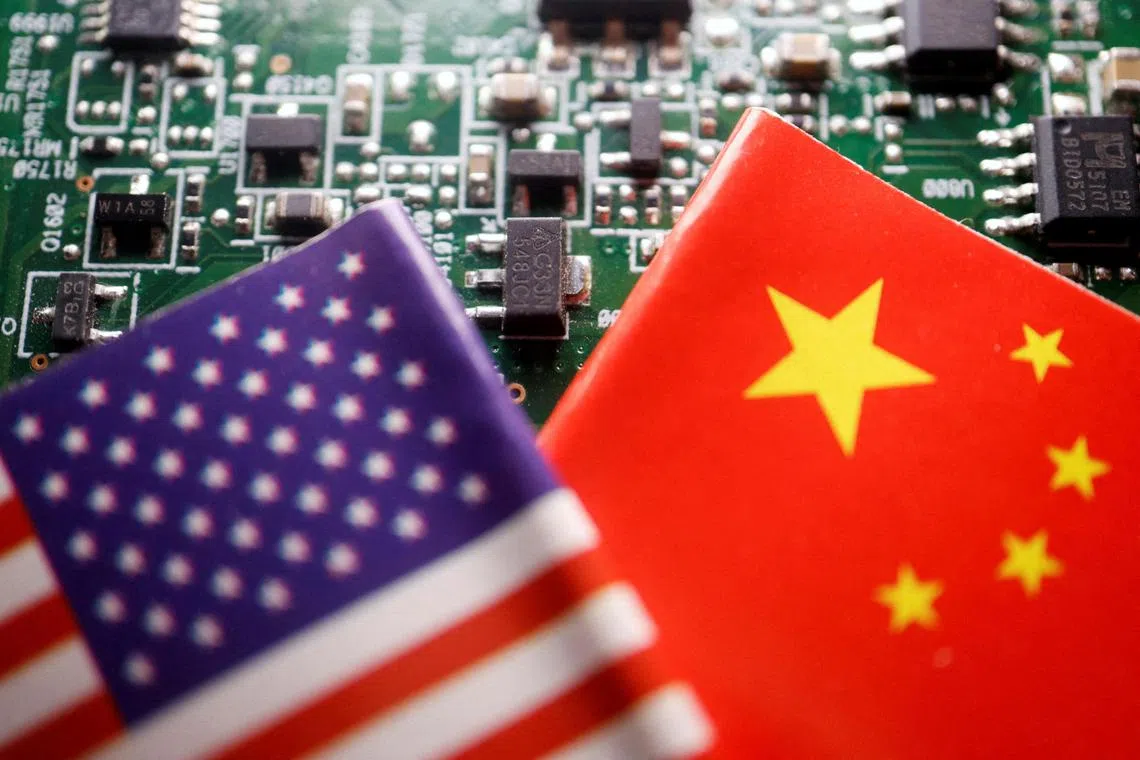China begins probe into US chip grants, alleged dumping
Sign up now: Get ST's newsletters delivered to your inbox

China will investigate allegations that the US dumps lower-end chips and unfairly subsidies its own chipmakers.
PHOTO: REUTERS
BEIJING - China will investigate allegations that the US dumps lower-end chips and unfairly subsidises its own chipmakers, in potentially one of Beijing’s strongest retaliatory moves against American technology sanctions.
The government will look into the question of whether the US is giving its chipmakers an unfair advantage through incentives and grants, or illegally undercutting Chinese products, the Commerce Ministry said in a statement on Jan 16.
The probe was begun in response to protests from local industry players, the agency said.
Chinese chipmakers have complained about the US Chips Act, which provides funding of some US$39 billion (S$53 billion) to entice firms like Taiwan Semiconductor Manufacturing and Samsung Electronics to build high-end chipmaking capacity in America
On Jan 16, China’s chip industry body took aim at a cornerstone of the Biden administration’s policy. “The US Chips and Science Act violates the fundamental principles of a market economy and caused profound and significant impact on the global semiconductor supply chain,” the China Semiconductor Industry Association said in a WeChat statement.
The Commerce Ministry did not name any company, but several US firms including Texas Instruments and Analog Devices rank among the leaders in lower-end products such as power and analogue chips.
Those are ubiquitous in modern devices from cars to appliances, helping regulate power flows or translate digital signals.
Beijing’s investigation echoes a longstanding US complaint, that China’s government openly bankrolls its domestic firms in contravention of global trade agreements.
US and European officials have also warned of the risk that Chinese companies, which are building capacity in mature nodes at a rapid clip, could eventually flood global markets with cheap chips.
It is unclear what the consequences could be for any company found violating antitrust or anti-dumping regulations.
The government could impose higher or company-specific tariffs, depending on its findings. Beijing has also in the past threatened US companies with either product bans or hefty fines.
Qualcomm a decade ago changed some of its key business and licensing practices and paid up a 6 billion yuan (S$1.1 billion) fine to put an end to a year-long antitrust case.
Micron Technology warned in 2023 that about half of its sales tied to China-headquartered clients may be hit by the country’s cyber-security probe.
And Beijing in 2024 launched a probe into whether Nvidia violated antitrust laws
The European Union was at one point considering a formal review of how widely its businesses use mature or lower-end chips from China, joining the US in flagging a potential risk to national security and global supply chains.
In May, Semiconductor Manufacturing International Corporation – China’s largest chipmaker – warned that prices are set to fall as chipmakers increase capacity, raising the alarm about growing price competition globally.
China imported close to 550 billion integrated circuit units in 2024, worth US$385.6 billion, customs data showed. The majority of those were older-generation chips powering products from washing machines to electric vehicles.
Beijing’s announcement on Jan 16 follows an unusually intense month for US trade sanctions against its geopolitical rival.
Just this week, the Biden administration unfurled regulations intended to curb the supply of artificial intelligence accelerators to China.
Nvidia and other tech firms have protested against the regulations, saying they hurt American innovation and were rushed into being in the final days of the departing administration.
Washington also added a number of key Chinese players to a trade-restrictions blacklist intended to curtail the sale of US technology. Those included Tencent Holdings-backed start-up Zhipu, one of a handful of fledgling firms considered front runners in the race to develop an answer to OpenAI’s ChatGPT. BLOOMBERG


